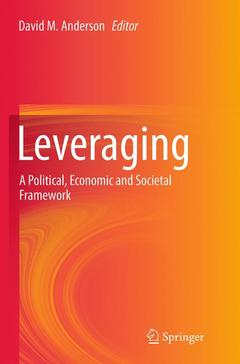Description
Leveraging, Softcover reprint of the original 1st ed. 2014
A Political, Economic and Societal Framework
Coordinator: Anderson David M.
Language: English
Subjects for Leveraging:
Publication date: 09-2016
Support: Print on demand
Publication date: 06-2014
197 p. · 15.5x23.5 cm · Hardback
Description
/li>Contents
/li>Biography
/li>Comment
/li>
David M. Anderson is Senior Vice President, State Relations, at The Washington Center for Internships and Academic Seminars. He has taught at The George Washington University, the University of Cincinnati, and Johns Hopkins University.
Examines the role of bargaining leverage, resource leverage and investment leverage across societal sectors
Investigates the role of leverage in the economic crisis of 2008-09 and in the broader context of the theory of capitalism
Discusses the risk and theory behind over-leveraging in both economic and political contexts
Includes supplementary material: sn.pub/extras




